This project features interviews from Yale alumni to explore the hearts and minds of those working at the intersection of spiritual leadership and environmental action. From eco-theologians to climate protesters, from ecological chaplains to bird and water protectors—this conversation series highlights how alumni are forging unique vocational paths as advocates for our blue-green planetary home. Their stories remind us that our ecological crisis is not only economic, political, or social—but also spiritual in nature. Explore how these leaders are responding to a time of climate crisis, mass extinction, and environmental injustice with bold, creative visions that inspire hope for a more just and flourishing future.
For more on the interview project, see this feature from Chris Freimuth and Yale Divinity School.
Subscribe to our monthly Forum newsletter for news on this growing academic field and moral force. You will receive the latest updates on these featured interviews and behind-the-scenes reflections. Conferences, webinars, classes, and publications are featured as well.
For information on the Yale Divinity School Master’s Program in Religion and Ecology contact:
Ryan Darr, ryan.darr@yale.edu
For information on the MA program in Religion and Ecology with the Yale School of the Environment contact:
Justin Farrell, justin.farrell@yale.edu
For information from the Yale Divinity School Alumnae office and for details on the YDS Religion and Ecology Alumni Reunion October 6-7, 2025, contact:
Bryce Tapp, bryce.tapp@yale.edu
With special thanks to Tali Anisfeld, Sam King, Nikki Woods, and Mary Evelyn Tucker for conducting the interviews; to Nikki Woods for lovingly editing many hours of video; to Tara Trapani, Elizabeth McAnally, and Jessica Battcher for creating the website section; and to Tom Krattenmaker, Nikki Woods, and Fatima Aw for doing the promotional work.
To access the interviews, click on each interviewees name, below.
Interviewees
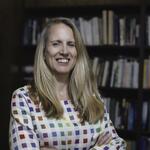 Elizabeth Allison is a leader in the field of Religion & Ecology, and an environmental social scientist who studies the convergence of religion and ethics with environmental policy and practice. She is Professor of Ecology and Religion at the California Institute of Integral Studies in San Francisco, where she founded and chairs the graduate program in Ecology, Spirituality, and Religion and created the Religion & Ecology Summit series of annual conferences. She is a member of the Advisory Group for the Yale Forum on Religion & Ecology; an editorial board member for the journal Worldviews: Global Religions, Culture, and Ecology; and past Secretary (2021-2024) of the International Society for the Study of Religion, Nature, and Culture.
Elizabeth Allison is a leader in the field of Religion & Ecology, and an environmental social scientist who studies the convergence of religion and ethics with environmental policy and practice. She is Professor of Ecology and Religion at the California Institute of Integral Studies in San Francisco, where she founded and chairs the graduate program in Ecology, Spirituality, and Religion and created the Religion & Ecology Summit series of annual conferences. She is a member of the Advisory Group for the Yale Forum on Religion & Ecology; an editorial board member for the journal Worldviews: Global Religions, Culture, and Ecology; and past Secretary (2021-2024) of the International Society for the Study of Religion, Nature, and Culture. Jim Antal is a denominational leader, climate activist, author and public theologian. He serves as Special Advisor on Climate Justice to the General Minister and President of the United Church of Christ. An environmental activist since the first Earth Day, he has preached on the climate crisis since 1988 in over 400 settings and has engaged in non-violent civil disobedience on numerous occasions. Antal’s book, “Climate Church, Climate World” now available in a revised and updated 2nd edition, is being studied by hundreds of congregations. It has been featured in the Chicago Tribune, in Christian Century Magazine and by the AAR. Antal is a graduate of Princeton University, Yale Divinity School and Andover Newton Theological School.
Jim Antal is a denominational leader, climate activist, author and public theologian. He serves as Special Advisor on Climate Justice to the General Minister and President of the United Church of Christ. An environmental activist since the first Earth Day, he has preached on the climate crisis since 1988 in over 400 settings and has engaged in non-violent civil disobedience on numerous occasions. Antal’s book, “Climate Church, Climate World” now available in a revised and updated 2nd edition, is being studied by hundreds of congregations. It has been featured in the Chicago Tribune, in Christian Century Magazine and by the AAR. Antal is a graduate of Princeton University, Yale Divinity School and Andover Newton Theological School.
 Meredith Barges is a bird-friendly building policy advocate and educator, and a former policy researcher for the Yale Bird-Friendly Building Initiative. Through her work, she helps people to understand and appreciate the complex lives of birds, how birds interact with the built environment, and how our decisions about buildings, lighting, and landscaping affect bird populations, with existential stakes. She co-authored “Building Safer Cities for Birds: How Cities Are Leading the Way on Bird-Friendly Building Policy” (American Bird Conservancy & Yale Law School, 2023). In 2021, she helped to convince Yale Divinity School to join Lights Out. She holds an MA in history from the University of Chicago and an MDiv from Yale Divinity School with a focus on religion & ecology.
Meredith Barges is a bird-friendly building policy advocate and educator, and a former policy researcher for the Yale Bird-Friendly Building Initiative. Through her work, she helps people to understand and appreciate the complex lives of birds, how birds interact with the built environment, and how our decisions about buildings, lighting, and landscaping affect bird populations, with existential stakes. She co-authored “Building Safer Cities for Birds: How Cities Are Leading the Way on Bird-Friendly Building Policy” (American Bird Conservancy & Yale Law School, 2023). In 2021, she helped to convince Yale Divinity School to join Lights Out. She holds an MA in history from the University of Chicago and an MDiv from Yale Divinity School with a focus on religion & ecology.
 Claire Barnes is a young publishing professional originally from Los Angeles, CA. She has an undergraduate degree from Emory University, and two graduate degrees from The University of St Andrews and Yale Divinity School. She developed an interest in food studies working in community gardens around Los Angeles. Claire studied the intersection of food, religion, and politics in the archives and continues to explore these topics as a marketer at Yale University Press. In her free time, you can find her reading about psychology, painting, and walking her dog around East Rock.
Claire Barnes is a young publishing professional originally from Los Angeles, CA. She has an undergraduate degree from Emory University, and two graduate degrees from The University of St Andrews and Yale Divinity School. She developed an interest in food studies working in community gardens around Los Angeles. Claire studied the intersection of food, religion, and politics in the archives and continues to explore these topics as a marketer at Yale University Press. In her free time, you can find her reading about psychology, painting, and walking her dog around East Rock.
 The Rev. Dr. Andrew Barnett is an Episcopal priest, musician, and educator, focused on local climate partnerships. He is the Senior Associate Rector for Program at the all saints episcopal Church in atlanta. As founding director of the Theodicy Jazz Collective, Andy has performed broadly across the United States and England. In his environmental work, Andy researched and wrote for the Presidential Climate Action Project – a menu of policy options that was presented to President Obama and informed that administration’s climate action. As a teacher, Andy is passionate about local and global partnerships, aiming to love God, love our neighbors, and change the world.
The Rev. Dr. Andrew Barnett is an Episcopal priest, musician, and educator, focused on local climate partnerships. He is the Senior Associate Rector for Program at the all saints episcopal Church in atlanta. As founding director of the Theodicy Jazz Collective, Andy has performed broadly across the United States and England. In his environmental work, Andy researched and wrote for the Presidential Climate Action Project – a menu of policy options that was presented to President Obama and informed that administration’s climate action. As a teacher, Andy is passionate about local and global partnerships, aiming to love God, love our neighbors, and change the world. Stephen Blackmer is founder and former priest at Church of the Woods in Canterbury NH. Before being ordained in the Episcopal Church, Steve worked for 25 years in forest conservation in the Northern Forest region of New England and New York. He holds a bachelor’s degree in Anthropology from Dartmouth College and master’s degrees in Forestry (1983) and in Religion & Ecology (2012) from Yale University. Steve lives in an off-grid chapel in the woods where Church of the Woods meets where he is a writer, forest guardian, and spiritual companion.
Stephen Blackmer is founder and former priest at Church of the Woods in Canterbury NH. Before being ordained in the Episcopal Church, Steve worked for 25 years in forest conservation in the Northern Forest region of New England and New York. He holds a bachelor’s degree in Anthropology from Dartmouth College and master’s degrees in Forestry (1983) and in Religion & Ecology (2012) from Yale University. Steve lives in an off-grid chapel in the woods where Church of the Woods meets where he is a writer, forest guardian, and spiritual companion.
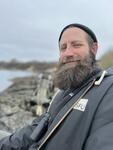 Jason M. Brown was born and raised in Southern California and studied anthropology and international development as an undergraduate at Brigham Young University. His master’s work was completed in forestry and theology from Yale. He completed his PhD in 2017 from the Institute for Resources, Environment and Sustainability (IRES) at the University of British Columbia where his dissertation explored the sense of place of contemporary Catholic monks in the American West. As a Lecturer at Simon Fraser University, Jason teaches courses in comparative religion and ecological humanities for the department of Global Humanities and occasionally environmental ethics for the School of Resource and Environmental Management. He is also the first Ecological Chaplain at SFU. Jason writes at www.holyscapes.org
Jason M. Brown was born and raised in Southern California and studied anthropology and international development as an undergraduate at Brigham Young University. His master’s work was completed in forestry and theology from Yale. He completed his PhD in 2017 from the Institute for Resources, Environment and Sustainability (IRES) at the University of British Columbia where his dissertation explored the sense of place of contemporary Catholic monks in the American West. As a Lecturer at Simon Fraser University, Jason teaches courses in comparative religion and ecological humanities for the department of Global Humanities and occasionally environmental ethics for the School of Resource and Environmental Management. He is also the first Ecological Chaplain at SFU. Jason writes at www.holyscapes.org
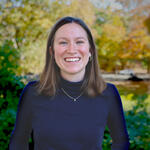 Liz Burkemper serves as program coordinator for the Life Worth Living Program at the Yale Center for Faith & Culture. Liz grew up on a rural Missouri farm but has devoted her recent years to learning on the east coast, receiving a B.A. in Peace Studies and Sustainability from the George Washington University in 2020 and an M.A.R. in Religion and Ecology from Yale Divinity School in 2022. Prior to joining YCFC, she worked as a research assistant at the Yale Forum on Religion and Ecology. To the Center she brings her love of Thomas Merton, Thich Nhat Hanh, and Ross Gay, as well as her interest in cultivating attentiveness and responsiveness to multispecies entanglements in everyday life. When she’s not at YCFC, Liz loves exchanging snail mail, taking long walks, hiking, playing tennis, and doing farm work at her family’s home in Missouri.
Liz Burkemper serves as program coordinator for the Life Worth Living Program at the Yale Center for Faith & Culture. Liz grew up on a rural Missouri farm but has devoted her recent years to learning on the east coast, receiving a B.A. in Peace Studies and Sustainability from the George Washington University in 2020 and an M.A.R. in Religion and Ecology from Yale Divinity School in 2022. Prior to joining YCFC, she worked as a research assistant at the Yale Forum on Religion and Ecology. To the Center she brings her love of Thomas Merton, Thich Nhat Hanh, and Ross Gay, as well as her interest in cultivating attentiveness and responsiveness to multispecies entanglements in everyday life. When she’s not at YCFC, Liz loves exchanging snail mail, taking long walks, hiking, playing tennis, and doing farm work at her family’s home in Missouri.
 Leif Castren is a Program Associate at the Dialogue on Science, Ethics, and Religion Program of the American Association for the Advancement of Science. Leif lives in DC but grew up in Washington State and Montana. Leif earned a BA in Biology from Middlebury College, and graduated with a MA in Religion from Yale Divinity School, and a MEM from Yale School of the Environment in 2020, and received a certificate from the Yale Interdisciplinary Center for Bioethics. As a Fulbright research fellow to Chile in 2017, Leif investigated the impacts of volcanic eruptions on forest ecosystems. Through his work at AAAS, Leif seeks to create opportunities for mutual learning around questions raised at the interface of religious life and ongoing scientific research. In focus, Leif supports theological schools as they engage forefront science through the Science for Seminaries initiative, drawing upon his experiences in scholarship, teaching, and counseling.
Leif Castren is a Program Associate at the Dialogue on Science, Ethics, and Religion Program of the American Association for the Advancement of Science. Leif lives in DC but grew up in Washington State and Montana. Leif earned a BA in Biology from Middlebury College, and graduated with a MA in Religion from Yale Divinity School, and a MEM from Yale School of the Environment in 2020, and received a certificate from the Yale Interdisciplinary Center for Bioethics. As a Fulbright research fellow to Chile in 2017, Leif investigated the impacts of volcanic eruptions on forest ecosystems. Through his work at AAAS, Leif seeks to create opportunities for mutual learning around questions raised at the interface of religious life and ongoing scientific research. In focus, Leif supports theological schools as they engage forefront science through the Science for Seminaries initiative, drawing upon his experiences in scholarship, teaching, and counseling.
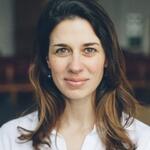 Frederica Helmiere is a complexity enthusiast and an aficionado of transformational learning experiences. Fascinated by the ways that consciousness, worldviews and discourses change and expand, she has spent the past twenty years exploring the tools available to respond to civilizational crises, especially the modern West's loss of the sacred. Frederica currently serves as Head of Workshops and Programs at Esalen Institute in Big Sur, CA. She has navigated an unconventional career path, with stints as a Peace Corps volunteer, log cabin builder, college admissions counselor, university professor, global interfaith peacebuilder, and director of a training program for psychedelic guides.
Frederica Helmiere is a complexity enthusiast and an aficionado of transformational learning experiences. Fascinated by the ways that consciousness, worldviews and discourses change and expand, she has spent the past twenty years exploring the tools available to respond to civilizational crises, especially the modern West's loss of the sacred. Frederica currently serves as Head of Workshops and Programs at Esalen Institute in Big Sur, CA. She has navigated an unconventional career path, with stints as a Peace Corps volunteer, log cabin builder, college admissions counselor, university professor, global interfaith peacebuilder, and director of a training program for psychedelic guides.
 Greg Hitzhusen is Assistant Professor of Professional Practice in Religion, Ecology and Sustainability at The Ohio State University School of Environment and Natural Resources; he sits on the Steering Team of the Center for Ethics and Human Values at OSU, and was founding director and board chair of Ohio Interfaith Power and Light. He has previously worked for the National Religious Partnership for the Environment and as Land Stewardship Specialist for the National Council of Churches Eco-Justice Programs, and his teaching and research focus on the intersection of faith and environment, building sustainable communities, and partnerships between scientific and faith communities.
Greg Hitzhusen is Assistant Professor of Professional Practice in Religion, Ecology and Sustainability at The Ohio State University School of Environment and Natural Resources; he sits on the Steering Team of the Center for Ethics and Human Values at OSU, and was founding director and board chair of Ohio Interfaith Power and Light. He has previously worked for the National Religious Partnership for the Environment and as Land Stewardship Specialist for the National Council of Churches Eco-Justice Programs, and his teaching and research focus on the intersection of faith and environment, building sustainable communities, and partnerships between scientific and faith communities.
 Julia Johnson is the Head of Food Business USA at Compassion in World Farming where she works to drive improvements in farm animal welfare and environmental sustainability in our food system. Julia is particularly interested in regenerative agriculture, transitional farming, and ensuring biodiversity in our ecosystems. Julia holds a Master of Science in Anthrozoology from Canisius College, a Master of Divinity from Yale University, and a Bachelor of Arts from Michigan State University. She is an equestrian at heart and lives in Michigan with her family and paint horse.
Julia Johnson is the Head of Food Business USA at Compassion in World Farming where she works to drive improvements in farm animal welfare and environmental sustainability in our food system. Julia is particularly interested in regenerative agriculture, transitional farming, and ensuring biodiversity in our ecosystems. Julia holds a Master of Science in Anthrozoology from Canisius College, a Master of Divinity from Yale University, and a Bachelor of Arts from Michigan State University. She is an equestrian at heart and lives in Michigan with her family and paint horse.
 Rev. Stephanie Johnson is a preacher, teacher and workshop leader around climate change justice, eco-grief and creation care. She won the 2011 St. Francis Philanthropic Award for Preaching on Creation Care from Earth Ministries in Seattle. Rev. Johnson is on the Leadership Circle for Blessed Tomorrow and the Advisory Board at the Center for Earth Ethics at Union Theological Seminary. She is the author of “How Can I Care for Creation” published by Church Publishing. She is the former chair on the Episcopal Church’s Task Force for Care of Creation and Environmental Racism. She has an M.Div and Master in Sacred Theology in environmental theologies from Yale Divinity School. She serves as Rector of St. Paul's Episcopal Church in Riverside CT.
Rev. Stephanie Johnson is a preacher, teacher and workshop leader around climate change justice, eco-grief and creation care. She won the 2011 St. Francis Philanthropic Award for Preaching on Creation Care from Earth Ministries in Seattle. Rev. Johnson is on the Leadership Circle for Blessed Tomorrow and the Advisory Board at the Center for Earth Ethics at Union Theological Seminary. She is the author of “How Can I Care for Creation” published by Church Publishing. She is the former chair on the Episcopal Church’s Task Force for Care of Creation and Environmental Racism. She has an M.Div and Master in Sacred Theology in environmental theologies from Yale Divinity School. She serves as Rector of St. Paul's Episcopal Church in Riverside CT.
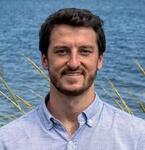 Sam King is an environmental educator, writer, and activist. He serves as lead mentor for the Yale/Coursera online courses in Religions and Ecology, which he helped develop with Mary Evelyn Tucker and John Grim. He is also Project Manager for the Emmy Award-winning Journey of the Universe film and multimedia project, hosting the Journey of the Universe: 10 Years Later podcast and editing the monthly newsletter. Sam received a Master of Arts in Religion and Ecology with a certificate in Educational Leadership and Ministry from Yale Divinity School. He also served as a Teaching Fellow at the Yale School of the Environment. A former Fulbright Scholar in Sri Lanka, Sam taught at the University of Sri Jayewardenepura and researched agrarian Buddhist rituals. He has also taught English, Environmental Science, Philosophy, and Religion at The Hotchkiss School and Phillips Academy Andover Summer Session. He holds a B.A. in Religion and Environmental Studies from Bowdoin College. An avid gardener, forager, and outdoorsman, Sam lives on ancestral Quinnipiac land in New Haven, CT.
Sam King is an environmental educator, writer, and activist. He serves as lead mentor for the Yale/Coursera online courses in Religions and Ecology, which he helped develop with Mary Evelyn Tucker and John Grim. He is also Project Manager for the Emmy Award-winning Journey of the Universe film and multimedia project, hosting the Journey of the Universe: 10 Years Later podcast and editing the monthly newsletter. Sam received a Master of Arts in Religion and Ecology with a certificate in Educational Leadership and Ministry from Yale Divinity School. He also served as a Teaching Fellow at the Yale School of the Environment. A former Fulbright Scholar in Sri Lanka, Sam taught at the University of Sri Jayewardenepura and researched agrarian Buddhist rituals. He has also taught English, Environmental Science, Philosophy, and Religion at The Hotchkiss School and Phillips Academy Andover Summer Session. He holds a B.A. in Religion and Environmental Studies from Bowdoin College. An avid gardener, forager, and outdoorsman, Sam lives on ancestral Quinnipiac land in New Haven, CT.
 Cameron Kritikos has served most recently as the Urban Climate Leadership Certificate Program Manager for the Yale School of the Environment. Cameron is an appointed member of the City of New Haven’s Climate Emergency Taskforce. He is also a 2023 graduate of Yale University with both his Masters of Environmental Management and Masters of Divinity. Cameron previously worked for BlocPower, a Brooklyn-based climate technology company rapidly greening American cities, developing New York City’s Civilian Climate Corps. Prior to Yale University, Cameron served as the Mobilizing and Advocacy Fellow at the Christian Reformed Church’s Office of Social Justice where he connected communities of faith in the U.S. and Canada to sustainable technologies, elected officials, worship resources, and educational opportunities to address climate change. He received his Bachelor of Arts in International Development Studies from Calvin University in 2017.
Cameron Kritikos has served most recently as the Urban Climate Leadership Certificate Program Manager for the Yale School of the Environment. Cameron is an appointed member of the City of New Haven’s Climate Emergency Taskforce. He is also a 2023 graduate of Yale University with both his Masters of Environmental Management and Masters of Divinity. Cameron previously worked for BlocPower, a Brooklyn-based climate technology company rapidly greening American cities, developing New York City’s Civilian Climate Corps. Prior to Yale University, Cameron served as the Mobilizing and Advocacy Fellow at the Christian Reformed Church’s Office of Social Justice where he connected communities of faith in the U.S. and Canada to sustainable technologies, elected officials, worship resources, and educational opportunities to address climate change. He received his Bachelor of Arts in International Development Studies from Calvin University in 2017.
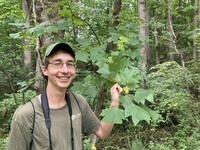 Gabe LePage is a recent graduate of Yale Divinity School and Yale School of the Environment, holding a Masters of Divinity and a Masters of Environmental Management. His undergraduate degrees were in International Development Studies and Geography at Calvin College. He has experience in urban forestry programs, urban agriculture and community gardening, and Asset Based Community Development. Trained in systems thinking and participatory organizing techniques, he believes strongly in the ways that community-led greenspaces and gardens build the social fabric of our neighborhoods, reduce isolation, and build trust for addressing larger systemic issues.
Gabe LePage is a recent graduate of Yale Divinity School and Yale School of the Environment, holding a Masters of Divinity and a Masters of Environmental Management. His undergraduate degrees were in International Development Studies and Geography at Calvin College. He has experience in urban forestry programs, urban agriculture and community gardening, and Asset Based Community Development. Trained in systems thinking and participatory organizing techniques, he believes strongly in the ways that community-led greenspaces and gardens build the social fabric of our neighborhoods, reduce isolation, and build trust for addressing larger systemic issues.
 Blair Nelsen currently serves as Executive Director of the eco-spiritual non-profit Waterspirit and as representative for the Congregation of the Sisters of St. Joseph of Peace at the United Nations. Her work builds bridges between the grassroots and the international on faith and environmental issues. Blair is the co-author of the Climate Pastoral Care Course, available through Thinkific. She speaks and publishes on various topics in the field of religion and ecology, including climate emotions, environmental justice, eco-spirituality, and water advocacy. Earth-based spiritualities have long guided her personal and professional interests. Blair’s work in the field of religion and ecology is informed by her personal multi-faith perspective as a member of the Self-Realization Fellowship Church and a long-time practitioner of Wicca. Her international perspective is informed by her adolescence in Venezuela and her early career in Brazil. She is also a permaculturist, forager, meditation guide, and nature poet.
Blair Nelsen currently serves as Executive Director of the eco-spiritual non-profit Waterspirit and as representative for the Congregation of the Sisters of St. Joseph of Peace at the United Nations. Her work builds bridges between the grassroots and the international on faith and environmental issues. Blair is the co-author of the Climate Pastoral Care Course, available through Thinkific. She speaks and publishes on various topics in the field of religion and ecology, including climate emotions, environmental justice, eco-spirituality, and water advocacy. Earth-based spiritualities have long guided her personal and professional interests. Blair’s work in the field of religion and ecology is informed by her personal multi-faith perspective as a member of the Self-Realization Fellowship Church and a long-time practitioner of Wicca. Her international perspective is informed by her adolescence in Venezuela and her early career in Brazil. She is also a permaculturist, forager, meditation guide, and nature poet.
 Tyler Mark Nelson is an educator, eco-theologian, and artist exploring the ways that humans make sense of their creaturely existence in relation to the more-than-human world and the divine. Serving as a Research Associate with the Forum, he compiled scientific, legal, and social research on the sentience of nonhuman animals and plants. Currently he is assisting with preparations for the launch of the exciting Living Earth Community project. Tyler earned an MDiv in Religion & Ecology from Yale Divinity School, where his research combined theological imagination, animal studies, eco-spirituality, and environmental justice. He received the Harriet Jackson Ely Prize for Excellence and Promise in Theology for his critical eco-theological analysis of how religious movements relate to wild places in the United States. He holds a B.A. in Theology from Whitworth University. Elsewhere Tyler has guided eco-spiritual retreats (in-person and virtual), facilitated climate grief groups, and designed educational resources for spiritual community leaders. In prior years he worked in horticulture administration, vermiculture operations, and similar roles where his care for earth and earthlings coalesced.
Tyler Mark Nelson is an educator, eco-theologian, and artist exploring the ways that humans make sense of their creaturely existence in relation to the more-than-human world and the divine. Serving as a Research Associate with the Forum, he compiled scientific, legal, and social research on the sentience of nonhuman animals and plants. Currently he is assisting with preparations for the launch of the exciting Living Earth Community project. Tyler earned an MDiv in Religion & Ecology from Yale Divinity School, where his research combined theological imagination, animal studies, eco-spirituality, and environmental justice. He received the Harriet Jackson Ely Prize for Excellence and Promise in Theology for his critical eco-theological analysis of how religious movements relate to wild places in the United States. He holds a B.A. in Theology from Whitworth University. Elsewhere Tyler has guided eco-spiritual retreats (in-person and virtual), facilitated climate grief groups, and designed educational resources for spiritual community leaders. In prior years he worked in horticulture administration, vermiculture operations, and similar roles where his care for earth and earthlings coalesced.
 Russell Powell is Research Affiliate and Research & Program Specialist for the Thinking with Plants & Fungi Research Initiative at the Center for the Study of World Religions at Harvard Divinity School. His research is on the religious, ethical, and political resonances of contemporary environmental issues, particularly the religious dimension of American environmental thought. Prior to joining the CSWR, Russell taught at Boston College as a Core Fellow and Visiting Assistant Professor of Environmental Theology and Ethics. Russell earned his doctorate in the multidisciplinary Religion and Society program at Princeton Theological Seminary in 2019. He has held teaching positions at the College of the Holy Cross, Amherst College, and Princeton University.
Russell Powell is Research Affiliate and Research & Program Specialist for the Thinking with Plants & Fungi Research Initiative at the Center for the Study of World Religions at Harvard Divinity School. His research is on the religious, ethical, and political resonances of contemporary environmental issues, particularly the religious dimension of American environmental thought. Prior to joining the CSWR, Russell taught at Boston College as a Core Fellow and Visiting Assistant Professor of Environmental Theology and Ethics. Russell earned his doctorate in the multidisciplinary Religion and Society program at Princeton Theological Seminary in 2019. He has held teaching positions at the College of the Holy Cross, Amherst College, and Princeton University.
 Katharine M. Preston is an ecumenical lay preacher and writer, concentrating on issues of the climate crisis, social justice, and the relationship of humans to the non-human world. She has an environmental science degree from the Yale School of Forestry and Environmental Studies (as it was then) and a Masters of Divinity from Andover Newton Theological School (as it was then). She and her husband, John Bingham, live on a farm in Essex, New York and are active Associates of the Iona Community. (katharinepreston.com)
Katharine M. Preston is an ecumenical lay preacher and writer, concentrating on issues of the climate crisis, social justice, and the relationship of humans to the non-human world. She has an environmental science degree from the Yale School of Forestry and Environmental Studies (as it was then) and a Masters of Divinity from Andover Newton Theological School (as it was then). She and her husband, John Bingham, live on a farm in Essex, New York and are active Associates of the Iona Community. (katharinepreston.com)
 Christopher Glenn Sawyer, M.Div ’75, has served on the Dean’s Advisory Council since 1996, including serving as its Chair for over 14 years during essentially the complete restoration of the YDS historical campus. Towards the end of that time, he became instrumental in envisioning and developing the plans for the Living Village as well in helping to raise the funds to develop it. He then energetically supported its construction through its beautiful completion. Chris continues to serve enthusiastically on the Dean’s Council as its first Chair Emeritus. Beyond Yale, Chris has served other important environmental, religious, business, and educational institutions across the country. Those include the Trust for Public Land (co-founder Georgia program and National Chair Emeritus); global Urban Land Institute Board (first environmental leader elected); the national Land Trust Alliance Board; the Rocky Mountain Institute Board; Founding Chair, The Nature Conservancy’s National Real Estate Advisory Council; Chairman, UGA’s Odum School of Ecology; Chair Emeritus, UNC’s Institute for the Environment; Member, Gray’s Reef National Marine Sanctuary Advisory Council; and others. Chris values all of these experiences, but is especially grateful that they have allowed him to participate in very small and large ways in conserving millions of acres of America's most precious land and similarly helping many to raise billions of dollars to achieve that. Chris currently serves as Senior Counsel at Alston & Bird in Atlanta where he has practiced law for 35 years.
Christopher Glenn Sawyer, M.Div ’75, has served on the Dean’s Advisory Council since 1996, including serving as its Chair for over 14 years during essentially the complete restoration of the YDS historical campus. Towards the end of that time, he became instrumental in envisioning and developing the plans for the Living Village as well in helping to raise the funds to develop it. He then energetically supported its construction through its beautiful completion. Chris continues to serve enthusiastically on the Dean’s Council as its first Chair Emeritus. Beyond Yale, Chris has served other important environmental, religious, business, and educational institutions across the country. Those include the Trust for Public Land (co-founder Georgia program and National Chair Emeritus); global Urban Land Institute Board (first environmental leader elected); the national Land Trust Alliance Board; the Rocky Mountain Institute Board; Founding Chair, The Nature Conservancy’s National Real Estate Advisory Council; Chairman, UGA’s Odum School of Ecology; Chair Emeritus, UNC’s Institute for the Environment; Member, Gray’s Reef National Marine Sanctuary Advisory Council; and others. Chris values all of these experiences, but is especially grateful that they have allowed him to participate in very small and large ways in conserving millions of acres of America's most precious land and similarly helping many to raise billions of dollars to achieve that. Chris currently serves as Senior Counsel at Alston & Bird in Atlanta where he has practiced law for 35 years.
 Caity Stuart is a visionary leader and environmental communicator dedicated to fostering inclusive, regenerative, and spiritually rooted responses to the climate crisis. With over 15 years of experience in sustainability program design, community organizing, and strategic planning, she has developed and led climate-focused initiatives across higher education, the private sector, and public lands. Caity’s work is shaped by a deep commitment to integrating environmental justice, emergent strategy, and sacred ecology into sustainable systems change and is influenced by her degrees from Yale Divinity School and Antioch University New England. You can often find Caity taking long walks, learning how to row, or savoring her time with friends.
Caity Stuart is a visionary leader and environmental communicator dedicated to fostering inclusive, regenerative, and spiritually rooted responses to the climate crisis. With over 15 years of experience in sustainability program design, community organizing, and strategic planning, she has developed and led climate-focused initiatives across higher education, the private sector, and public lands. Caity’s work is shaped by a deep commitment to integrating environmental justice, emergent strategy, and sacred ecology into sustainable systems change and is influenced by her degrees from Yale Divinity School and Antioch University New England. You can often find Caity taking long walks, learning how to row, or savoring her time with friends. Tara C. Trapani has been the Chief Administrator of the Yale Forum on Religion and Ecology since 2007. She also coordinates efforts for The Thomas Berry Foundation and has served as Project Coordinator for the Emmy Award-winning Journey of the Universe film and multimedia project. She has 25+ years’ experience in non-profit and educational administration, is a veteran event planner and organizer, and has prepared academic manuscripts for many publishers, including: Yale University Press, Columbia University Press, Island Press, Orbis Books, and Haworth Press. Tara has a MAR in Ethics from Yale Divinity and her undergraduate work in Comparative World Religions included a focus on West African tribal religions in the diaspora, Gnosticism/esoteric Christianity, and embodied expressions of the sacred. She also holds a certification in Administration and Community Development from Sunbridge College. In her spare time, she writes voluminously and is also a BFRP (Bach Flower Registered Practitioner), reiki master, genealogist, visual artist and artisan, and folk herbalist. Tara lives in the woods of Vermont with her family and a whole heap of frogs.
Tara C. Trapani has been the Chief Administrator of the Yale Forum on Religion and Ecology since 2007. She also coordinates efforts for The Thomas Berry Foundation and has served as Project Coordinator for the Emmy Award-winning Journey of the Universe film and multimedia project. She has 25+ years’ experience in non-profit and educational administration, is a veteran event planner and organizer, and has prepared academic manuscripts for many publishers, including: Yale University Press, Columbia University Press, Island Press, Orbis Books, and Haworth Press. Tara has a MAR in Ethics from Yale Divinity and her undergraduate work in Comparative World Religions included a focus on West African tribal religions in the diaspora, Gnosticism/esoteric Christianity, and embodied expressions of the sacred. She also holds a certification in Administration and Community Development from Sunbridge College. In her spare time, she writes voluminously and is also a BFRP (Bach Flower Registered Practitioner), reiki master, genealogist, visual artist and artisan, and folk herbalist. Tara lives in the woods of Vermont with her family and a whole heap of frogs.
